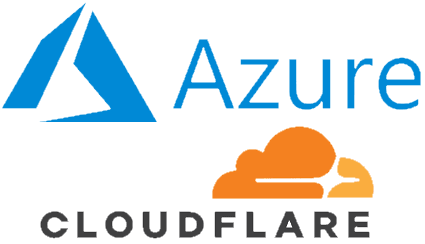Let us take a closer look at Azure DDoS protection vs Cloudflare to determine which is the right choice for you. With the support of Sever management support services, we can give you a detailed note on Azure vs Cloudflare to choose the best.
Pros: Azure DDoS protection vs Cloudflare

Azure DDoS
- The high efficiency and performance of Azure DDoS Protection make it unique and extremely useful.
- Individuals who frequently utilize Microsoft products, they can easily implement or integrate any features or products.
Cloudflare:
- Includes Key items such as the Lambda and DNS.
- It’s incredibly simple to use.
- The most valuable component of the solution is the DDoS defense.
- A novel and inventive approach to protecting the client’s data.
Azure DDoS protection vs Cloudflare: Cons
Azure DDoS
- Azure DDoS Protection’s reporting requires more improvement.
- As there are continual modifications, it can be difficult for our team to keep track of changes (in the GUI) between different projects.
- As a result, it is difficult to manage, recall, and see all of the features because of the relocation.
Cloudflare:
- The solution may end out being less expensive. It is very expensive to use.
- Latencies are always an issue.
- The CDN services are having some troubles.
Azure DDoS Protection vs Cloudflare: Pricing and Cost Advice
Azure DDoS:We have the option to test it for free for a set amount of time and set up a free account.
We can evaluate it and compare its advantages and disadvantages to those of other items we are testing.
Cloudflare: Cloudflare has a moderate and cost-effective pricing structure.
How do Cloudflare and Microsoft (Azure DDos protection) Differentiate in Protecting Against DDoS Attacks?
- Microsoft provides WAF functionalities as part of the Azure Application Gateway service. This enables for blocking against OWASP top ten and custom criteria, but does not provide rate limitation.
- Microsoft’s rate restriction tools are only available as part of the Azure Front Door WAF solution. This rate limit will connect to each client’s IP address that attempts to connect.
- Another issue is that Microsoft WAF only offers a few distinct actions, which are either LOG / BLOCK / ACCEPT. So in this case we cannot define JS challenges or more complicated actions to be executed with Azure WAF.
- Cloudflare offers rate limiting with varying features according on SKU level. (Along with geo-blocking, OWASP, and custom rules.)
More advanced actions, such as JS challenge, can also be made available, and custom actions, such as forwarding users to a custom error page, can be defined.
- Cloudflare-like Front Door rules are activated at the Edge.
This means that if we have a web service in Amsterdam but the users are from Australia, the various rules are processed at one of the PoP’s in Australia before reaching the web service.
- Cloudflare DDoS protection for layers 3 – 5; is set by default and can be significantly less expensive depending on the company’s size. It only costs roughly $200 per month for smaller businesses.
[Need assistance with similar queries? We are here to help]
Conclusion
To conclude we have gone through the azure DDoS protection vs Cloudflare to determine which is the best with the support of server management support services.
PREVENT YOUR SERVER FROM CRASHING!
Never again lose customers to poor server speed! Let us help you.
Our server experts will monitor & maintain your server 24/7 so that it remains lightning fast and secure.







0 Comments